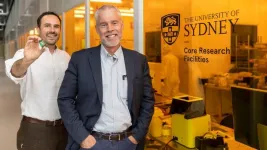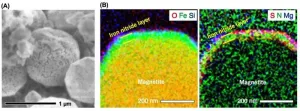(Press-News.org) BOSTON – Individuals can improve their brain care and reduce their risk of developing brain diseases such as dementia and stroke by focusing on a list of 12 steps covering modifiable physical, lifestyle, and social-emotional components of health.
The list was developed and validated in research published in Frontiers in Neurology by investigators from the McCance Center for Brain Health at Massachusetts General Hospital (MGH) and their collaborators in the United States and Europe.
For the study, the scientists derived a baseline Brain Care Score (BCS) at the start of enrollment for 398,990 adults aged 40–69 years in the UK Biobank.
Physical components of the brain score relate to blood pressure, blood sugar, cholesterol and body mass index.
Lifestyle components include nutrition, alcohol consumption, smoking, aerobic activities and sleep.
Social-emotional components involve stress management, social relationships and meaning in life.
In the original BCS, scores range from 0–21, with a higher score indicating better brain care. Because the UK Biobank had collected nearly all, but not all, components of the BCS in its study design, scores in the UK Biobank ranged from 0-19.
During a median follow-up of 12.5 years, there were 5,354 new cases of dementia and 7,259 strokes among the 398,990 UK Biobank participants in the study.
Investigators found that those with a higher BCS had a lower risk of developing dementia or stroke as they aged.
For example, each five-point positive difference in the BCS was associated with a 59% lower risk of developing dementia and a 48% lower risk for experiencing a stroke among adults younger than 50 years old at enrollment.
Similar estimates were found for participants aged 50–59 years (32% lower risk of dementia and 52% lower risk of stroke). Estimates for those older than 59 years (8% lower risk of dementia and 33% lower risk of stroke) were lower. The authors concluded that these lower estimates were because dementia in individuals in this age group can often be more slowly progressive. As a result early dementia can often be missed until it progresses further.
“Patients and practitioners can start focusing on improving their BCS today, and the good news is improving on these elements will also provide overall health benefits,” says senior author Jonathan Rosand MD, MSc, co-founder of the McCance Center for Brain Health at MGH, the J.P. Kistler Endowed Chair in Neurology at MGH, and a professor of Neurology at Harvard Medical School. “The components of the BCS include recommendations found in the American Heart Association’s Life’s Essential Eight for cardiovascular health, as well many modifiable risk factors for common cancers. What’s good for the brain is good for the heart and the rest of the body.”
Importantly, the study only evaluated the BCS at a single timepoint in people’s lives. Additional research is needed to determine whether a person can reduce their risk of having a stroke or developing dementia by improving their BCS over time through behavior changes and lifestyle choices, potentially with the help of clinicians and others who can provide support. The team is currently conducting studies to see what happens when people raise their BCS by 5 points or more.
“We have every reason to believe that improving your BCS over time will substantially reduce your risk of ever having a stroke or developing dementia in the future,” says Rosand. “But as scientists, we always want to see proof.”
Additional authors include Sanjula D. Singh, MD, PhD, MSc, Tin Oreskovic, MSc, Sinclair Carr, MS, Keren Papier, PhD, Megan Conroy, MSc, Jasper R. Senff, MD, Zeina Chemali, MD, MPH, Leidys Gutierrez-Martinez, MD, MSc, Livia Parodi, PhD, Ernst Mayerhofer, MD, Sandro Marini, MD, Courtney Nunley, MSc, Amy Newhouse, MD, An Ouyang, PhD, H. Bart Brouwers, MD PhD, Brandon Westover, MD, PhD, Cyprien Rivier, MD, Guido Falcone, MD, PhD, Virginia Howard, PhD, George Howard, PhD, Aleksandra Pikula, MD, Sarah Ibrahim, RN, MN, Kevin N. Sheth, MD, PhD, Nirupama Yechoor, MD, Ronald M. Lazar, MD, PhD, Christopher D. Anderson, MD, MMSc, Rudolph E. Tanzi, PhD, Gregory Fricchione, MD, and Thomas Littlejohns, PhD, MSc.
This research was supported by the US National Institutes of Health and American Heart Association.
About the Massachusetts General Hospital
Massachusetts General Hospital, founded in 1811, is the original and largest teaching hospital of Harvard Medical School. The Mass General Research Institute conducts the largest hospital-based research program in the nation, with annual research operations of more than $1 billion and comprises more than 9,500 researchers working across more than 30 institutes, centers and departments. In July 2022, Mass General was named #8 in the U.S. News & World Report list of "America’s Best Hospitals." MGH is a founding member of the Mass General Brigham healthcare system.
END
Mass General-developed brain care score (BCS) is a scientifically validated way to assess current health habits and risk to future brain health
Research links a higher Brain Care Score to a lower risk of developing dementia and stroke in the future
2023-12-01
ELSE PRESS RELEASES FROM THIS DATE:
Exercise training improves obesity-related dementia
2023-12-01
Obesity is a major risk factor for cardiovascular metabolic diseases and neurodegenerative diseases such as dementia. Long-term exercise improves memory and spatial cognition, reduces age-related cognitive decline, and maintains brain volume, but the mechanisms are not fully understood.
Recently, a study from Febbraio lab at Monash University reported that voluntary exercise training (VET) improves long-term memory in high-fat diet (HFD)-induced obese mice, increases hippocampal neurogenesis ...
Paleolithic humans may have understood the properties of rocks for making stone tools
2023-12-01
A research group led by the Nagoya University Museum and Graduate School of Environmental Studies in Japan has clarified differences in the physical characteristics of rocks used by early humans during the Paleolithic. They found that humans selected rock for a variety of reasons and not just because of how easy it was to break off. This suggests that early humans had the technical skill to discern the best rock for the tool. The researchers published the results in the Journal of Paleolithic Archaeology.
As Homo sapiens moved from Africa to Eurasia, they used stone tools made of rocks, such as obsidian and flint, to cut, slice, and craft ranged weapons. Because ...
A patch of protection against Zika virus
2023-12-01
A simple-to-apply, needle-free vaccine patch is being developed to protect people from the potentially deadly mosquito-borne Zika virus.
A prototype using The University of Queensland-developed and Vaxxas-commercialised high-density microarray patch (HD-MAP) has delivered a University of Adelaide-developed vaccine and elicited an effective immune response to Zika virus in mice.
UQ alum and Vaxxas researcher Dr Danushka Wijesundara said Zika virus was a risk to people across the Pacific, Southeast Asia, India, Africa and South and Central America.
“We can change the way we combat Zika virus with the ...
ORNL supports executive order for safe, secure and trustworthy AI
2023-12-01
As artificial intelligence technologies improve, they increase the efficiency and capabilities of research across the scientific spectrum. Because of the rapid pace of the field, AI tools must be developed sustainably, a guiding principle for the Department of Energy’s Oak Ridge National Laboratory throughout its 40 years of AI research. Now, its extensive array of resources are supporting the nation as it harnesses the power of these transformative technologies.
In October, President Biden ...
Photonic chip that ‘fits together like Lego’ opens door to semiconductor industry
2023-12-01
Researchers at the University of Sydney Nano Institute have invented a compact silicon semiconductor chip that integrates electronics with photonic, or light, components. The new technology significantly expands radio-frequency (RF) bandwidth and the ability to accurately control information flowing through the unit.
Expanded bandwidth means more information can flow through the chip and the inclusion of photonics allows for advanced filter controls, creating a versatile new semiconductor device.
Researchers expect the chip will have application in advanced radar, ...
Meteorites likely source of nitrogen for early Earth
2023-12-01
Micrometeorites originating from icy celestial bodies in the outer Solar System may be responsible for transporting nitrogen to the near-Earth region in the early days of our solar system. That discovery was published today in Nature Astronomy by an international team of researchers, including University of Hawai'i at Mānoa scientists, led by Kyoto University.
Nitrogen compounds, such as ammonium salts, are abundant in material born in regions far from the sun, but evidence of their transport to Earth's orbital region had been poorly understood.
"Our recent findings suggests the possibility that a greater amount of nitrogen compounds than previously ...
Can artificial intelligence improve life science? As much as life science can improve AI, researchers say
2023-12-01
Artificial intelligence (AI) may attempt to mimic the human brain, but it has yet to fully grasp the complexity of what it means to be human. While it may not truly understand feelings or original creativity, it can help us better understand ourselves — especially our physical bodies in health and in disease, according to a series of articles recently published by the journal Quantitative Biology.
The peer-reviewed papers — a variety of editorials, perspectives and commentaries on AI for life science — assess the rapid development of AI and recent attention ...
CureSHANK seeking RFAs to stimulate research of SHANK3-related epilepsy in Phelan-McDermid syndrome
2023-12-01
CureSHANK will award a total of $250,000 aimed at stimulating research on SHANK3-related epilepsy, prevalent in PMS patients. The grants, CureSHANK Research to Cure Grant: Epilepsy (R2C Epilepsy), will provide targeted funding to support SHANK3-related epilepsy research projects. The awards aim to improve mechanistic and clinical knowledge of SHANK3-related epilepsy.
The PMS community lives under the long shadow of epilepsy: it is responsible for many deaths of both children and young adults with PMS, and it is among the disorder's most distressing symptoms. Nearly one-third of individuals living with PMS are diagnosed with epilepsy, often evolving ...
Eating beans improves gut health, regulates immune and inflammatory processes in colorectal cancer survivors
2023-12-01
HOUSTON ― Incorporating navy beans into the diet of colorectal cancer (CRC) survivors has the potential to positively impact both gut and host health by modulating markers linked to obesity and disease, according to new research from The University of Texas MD Anderson Cancer Center.
The findings published today in eBIOMedicine, part of The Lancet family of journals, revealed BE GONE trial participants who added a cup of navy beans daily to their regular meals saw positive changes in their gut microbiome, which is associated with cancer prevention and improved treatment outcomes. Changes included an increase ...
One of the largest magnetic storms in history quantified: Aurorae covered much of the night sky from the Tropics to the Polar Regions
2023-12-01
In early November of this year, aurora borealis were observed at surprisingly low latitudes, as far south as Italy and Texas. Such phenomena indicate the impacts of a solar coronal mass ejection on the Earth's magnetic field and atmosphere. Far more dramatic than this recent light show was, it was nothing compared to a huge solar storm in February 872. The resulting auroral display from that event ringed the globe and produced auroras observed in sites as close to the equator as Bombay and Khartoum. An international team consisting of scientists from nine counties has now published a detailed study of this historically important event, tracing its ...
LAST 30 PRESS RELEASES:
Stem cells from human baby teeth show promise for treating cerebral palsy
Chimps’ love for crystals could help us understand our own ancestors’ fascination with these stones
Vaginal estrogen therapy not linked to cancer recurrence in survivors of endometrial cancer
How estrogen helps protect women from high blood pressure
Breaking the efficiency barrier: Researchers propose multi-stage solar system to harness the full spectrum
A new name, a new beginning: Building a green energy future together
From algorithms to atoms: How artificial intelligence is accelerating the discovery of next-generation energy materials
Loneliness linked to fear of embarrassment: teen research
New MOH–NUS Fellowship launched to strengthen everyday ethics in Singapore’s healthcare sector
Sungkyunkwan University researchers develop next-generation transparent electrode without rare metal indium
What's going on inside quantum computers?: New method simplifies process tomography
This ancient plant-eater had a twisted jaw and sideways-facing teeth
Jackdaw chicks listen to adults to learn about predators
Toxic algal bloom has taken a heavy toll on mental health
Beyond silicon: SKKU team presents Indium Selenide roadmap for ultra-low-power AI and quantum computing
Sugar comforts newborn babies during painful procedures
Pollen exposure linked to poorer exam results taken at the end of secondary school
7 hours 18 mins may be optimal sleep length for avoiding type 2 diabetes precursor
Around 6 deaths a year linked to clubbing in the UK
Children’s development set back years by Covid lockdowns, study reveals
Four decades of data give unique insight into the Sun’s inner life
Urban trees can absorb more CO₂ than cars emit during summer
Fund for Science and Technology awards $15 million to Scripps Oceanography
New NIH grant advances Lupus protein research
New farm-scale biochar system could cut agricultural emissions by 75 percent while removing carbon from the atmosphere
From herbal waste to high performance clean water material: Turning traditional medicine residues into powerful biochar
New sulfur-iron biochar shows powerful ability to lock up arsenic and cadmium in contaminated soils
AI-driven chart review accurately identifies potential rare disease trial participants in new study
Paleontologist Stephen Chester and colleagues reveal new clues about early primate evolution
UF research finds a gentler way to treat aggressive gum disease
[Press-News.org] Mass General-developed brain care score (BCS) is a scientifically validated way to assess current health habits and risk to future brain healthResearch links a higher Brain Care Score to a lower risk of developing dementia and stroke in the future









